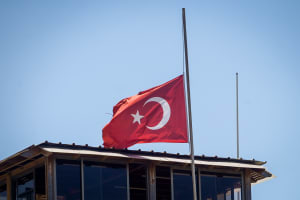Major cyberattacks on several Israeli hospitals last weekend represent sizeable upward trend
Attacks were thwarted, but constitute a 72% increase in attacks on nine Israeli hospitals

Israel was able to stop an onslaught of cyberattack attempts on the healthcare sector this past weekend, some of which are believed to have been carried out by Chinese hackers, Israel’s Health Ministry said.
According to Check Point, a leading Israeli IT security company, more than 600 cyberattack attempts per organization were recently registered on Israeli hospitals and other healthcare institutions. This constitutes a 72% increase in cyberattack attempts compared to the average.
All in all, some nine Israeli hospitals were targeted, according to the Israeli National Cyber Directorate and the Health Ministry.
“Early assessments and a quick response from the directorate and staff on the ground halted the attempts and no damage was caused,” the statement said.
In its initial assessment, the Israeli authorities concluded that a swift response on the ground prevented any serious damage to the Israeli health sector.
The Israeli National Cyber Directorate and the Health Ministry also added that there are increased efforts to “strengthen the level of [cyber] protection while identifying new vulnerabilities” in Israel’s health sector.
Last week, the Hillel Yaffe Medical Center in northern Israel reported that it had been targeted with a ransomware attack by hackers.
“This is probably a Chinese hacker group that broke away from another group and started working in August,” Health Ministry cybersecurity chief Reuven Eliyahu said in an interview on Army Radio. “The motive for the attack was purely financial.”
Despite the attack, the hospital reportedly succeeded in providing medical services to its patients by switching to alternate computer systems. However, the hackers succeeded in pushing the hospital offline for some time. Security experts believe it could take months to fully restore the hospital’s crippled systems.
A ransomware attack is the act of assaulting an organization’s networks in order to encrypt its data and, afterwards, demanding a ransom for unlocking the systems. Barzilai Medical Center in Ashkelon was another Israeli hospital that was recently a target of a ransomware attack. Check Point believes that the partially successful attack on the Hillel Yaffe Medical Center, made the hackers believe that the Israeli healthcare sector is vulnerable and thereby a reachable target.
In the age of increased IT-warfare, the Jewish state is considered to be among the leading countries in cyber-technology capabilities. In recent years, the southern Israeli city Beersheva has emerged as a leading global cyber-technology center. On the other hand, Israel is also one of the countries hardest hit by cyberattack attempts. Ransomware has become a global security threat. According to a new study report titled Ransomware in a global context published by the cybersecurity company VirusTotal, Israel experienced an almost 600% increase in reported ransomware attacks since 2020, more than any other country in the world. Other countries that were hit particularly hard by ransomware include South Korea, China, India, Iran, Great Britain and Singapore.
Last week, Microsoft reported that it had identified Iranian hackers who used Microsoft products to target U.S. and Israeli defense technology firms.
During the past year, Iran and the Jewish state have increasingly accused each other of attacks on civilian and military infrastructure. Tehran has accused Jerusalem of perpetrating several cyberattacks against Iran’s controversial nuclear weapons program while Israel has accused Iran of targeting Israeli civilian ships in the Middle East.
In July, Israel, the U.S. and Great Britain held Iran responsible for a drone attack on the Israeli-operated tank Mercer Street, which killed the ship’s Romanian captain and a British crew member.

The All Israel News Staff is a team of journalists in Israel.














